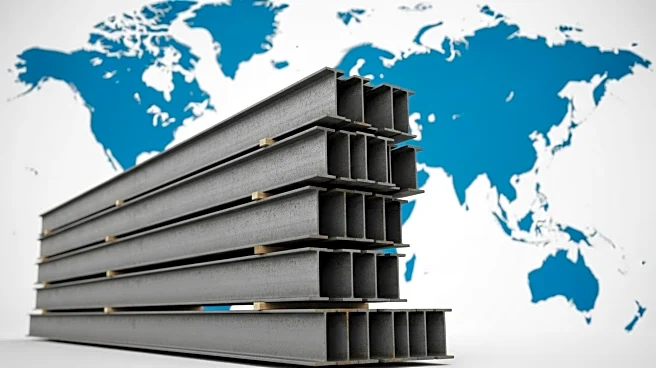What's Happening?
The European Union has announced a significant increase in steel tariffs and a reduction in import quotas, sparking concern in the United Kingdom and among European carmakers. The EU plans to cut tariff-free quotas on imported steel by 47% compared to 2024 levels and increase tariffs from 25% to 50% on excess imports. This move is intended to protect the EU steel industry and safeguard jobs, while supporting decarbonization efforts. The decision follows similar actions by the U.S. and Canada, which have imposed tariffs to counter cheaper imports, primarily from China. President Trump raised tariffs on steel and aluminum imports to 50% earlier this year, while Canada introduced a 25% surtax on steel imports from China.
Why It's Important?
The EU's tariff hike poses a significant threat to the U.K. steel industry, which exports around 80% of its steel to the EU. The increased tariffs could cut off access to this crucial market, exacerbating existing pressures from global competition and rising energy costs. The automotive industry, heavily reliant on steel, is also concerned about the inflationary impact on European market prices. The European Automobile Manufacturers' Association warns that the new measures could threaten the domestic car industry, which sources 90% of its steel from within the EU. These developments highlight the broader impact of trade tensions on international markets and industries.
What's Next?
The U.K. is likely to seek exemptions from the EU's tariffs, similar to those granted to Norway, Iceland, and Liechtenstein. The British government is in discussions with the EU and the U.S. regarding steel tariffs, and retaliatory measures may be considered. The EU has signaled a willingness to exempt Ukraine from the duties due to its security situation. The U.K. aims to protect trade flows with the EU while addressing global challenges. The automotive industry may continue to lobby against the tariffs, emphasizing their potential impact on market prices and industry stability.
Beyond the Headlines
The EU's tariff measures reflect broader geopolitical and economic dynamics, including efforts to protect domestic industries and address global steel overcapacity. The move underscores the challenges of balancing protectionist policies with the need for international cooperation in trade. The situation also highlights the interconnectedness of global markets, where actions by one region can have ripple effects across industries and economies worldwide.









